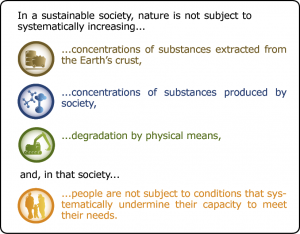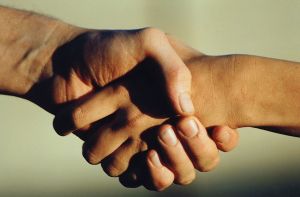OK quick survey: who here’s an Elvis fan? Really? Wow, that’s more than I expected!
Still, you’ll notice my hand didn’t go up. That’s because I’m not a fan .. not that I dislike the music, it’s just not me. However I came across an interesting sustainability blog which brought Elvis to mind the other day.
The blog is about sustainability in the meetings industry, and is called Less Conversation, More Action. Yes, rather witty that, and I do like the turtle-and-rocket image they use.
However what really grabbed me about the blog was a post about the four sustainability principles of the Sweden based organisation The Natural Step.
So off I scurried to The Natural Step’s website, and this is what I found…
Using principles to give direction
Something very different to many sustainability based company advisors. It took quite a bit of digging around because the website’s not the most well organised in the world. That may seem a bit harsh but it contains soo much more content than is represented in the menus and sidebars.
Anyway, after thrashing around a bit I finally found what I was after: an explanation of the the four principles of sustainability the Natural Step bases their work on.
The Natural Step looks at the world from a systems point of view and with the premise that, left to its own devices, Earth is a sustainable system. However, Man’s impact upon the planet has altered this so badly that our own existence is under threat. The answer is, therefore, to change the nature of Man’s impacts on the systemic level.
In the early 1990s The Natural Step reached a consensus with 50 of the world’s leading scientists as to what the features of a future sustainable society would be. These are a bit scientific-y in their language, but they basically say that Man’s society should not as a matter of systemic function extract or dump increasing materials, nor should it lay waste to greater areas of land or undermine people’s means to meet their needs.
This is the destination. Through a process known as backcasting The Natural Step reworded these features to become principles which could be more easily be communicated. Backcasting is an important part of The Natural Step’s work: unlike forecasting, which says “we’re here .. were are we heading to next?”, is says “we want to be there, what route should we take?”
In other words, rather than trying to work out where we’re going and then deciding how to act on it, The Natural Step uses basic principles to inform both direction and the action needed.
The Four Principles of Sustainability
Thus were the four principles of sustainability born. They are, with my own comments, as follows:
eliminate our contribution to the progressive buildup of substances extracted from the Earth’s crust: modern science holds that a finite amount of most minerals were embedded into the Earth at its creation. We cannot build a whole society or economy around pretending that these resources are infinite. This is what is fundamentally wrong with our current coal and oil based economy, and it’s also what is fundamentally wrong with the rare-earth mineral strategy for green energy. Changing a heroin addict’s medicine from heroin to methadone doesn’t fix the problem. We need a system which is not based upon the pretence that these finite resources will be replenished.
eliminate our contribution to the progressive buildup of chemicals and compounds produced by society: just as we basically rely upon the Earth to provide for us, so we rely upon it to dispose of our waste. However, we have increasingly adopted the attitude that it does not matter what the waste from a process is so long as the product is serviceable. It does not matter what this waste is, whether its nuclear, chemical or even biodegradable .. if too much is produced then the consequent build up undermines our ability to live sustainably.
eliminate our contribution to the progressive physical degradation and destruction of nature and natural processes: the ecology of the planet cannot be fully understood, but this does not mean it should be treated with wholesale disrespect. Our system of life should not need to swallow ever larger portions of the natural environment in order to support us, whether through suburban sprawl, hydroelectric schemes or industrialised agriculture.
eliminate our contribution to conditions that undermine people’s capacity to meet their basic human needs: human rights, it’s often said, is the poor relation to the environment whenever sustainability is discussed, and this phrase neatly sums up why. The nine basic needs The Natural Step supports are those of Manfred Max-Neef: subsistence, protection, affection, understanding, participation, leisure, creation, identity and freedom. Our present consumer economy is centred around eroding people’s ability to meet their needs under their own steam, so they need to part with money in order to make up the shortfall. Think of food for example: thanks to irradiation and a host of other chemical treatments the nutritional value of many fresh (that is to say, not frozen, canned or otherwise preserved) foods is now seriously in doubt. Social sustainability goes far beyond living wages and working hours.
The vital thing about these principles is that they are not “thou shalt not” commandments. They are all to do with what is part of the everyday systemic impacts our lives and economies have on the planet an people around us.
The Natural Step is by no means a new organisation: it was founded in the late 1980s just after the Brundtland Commission gave its final report. Nor is it particularly niche, working as it does with organisations as diverse as Forum for the Future and Nike.
However it does tend to keep a low profile, so I hope highlighting these principles has given you something more to think about. And I strongly suggest investigating their website, but do put a good bit of time aside because it holds many interesting niches for those prepared to search!
A former CTO, Chris has a broad and varied background. He’s been involved with blue chips, consultancies & SMEs across a wide variety of sectors and has worked in Europe, the Middle East and Australia.
In 2007 he decided to combine his knowledge of business and IT with his passion for all things sustainable and has been busy writing ever since. However, his greatest ambition remains to brew the perfect cup of coffee.


